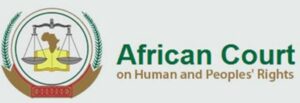AU opens nominations for two new judges to the African Court
 The African Union Commission will hold an election during the 41st Ordinary Session scheduled for June/July 2022 to elect and appoint two new Judges to fill vacant seats on the African Court on Human and Peoples’ Rights.
The African Union Commission will hold an election during the 41st Ordinary Session scheduled for June/July 2022 to elect and appoint two new Judges to fill vacant seats on the African Court on Human and Peoples’ Rights.
The terms of office of two African Court Judges will expire in July 2022 –
Ms. Marie-Theresa Mukamulisa who occupies the floating seat from Rwanda elected in June 2016 for a 6-year term, and Ms. Ntyam Ondo Mengue from Cameroon elected in June 2016 for a 6-year term.
The AU Commission in a statement available to the Ghana News Agency in Tema, invited State Parties to the Protocol to the African Charter on Human and Peoples’ Rights on the Establishment of an African Court to submit their candidatures/nominations accompanied by curricula vitae of the nominees.
According to the AU Commission, the particulars of the State Parties candidate must be presented in a sealed envelope addressed and delivered to the office of the Legal Counsel, AU Commission, on or before May 31, 2022.
The AU Commission said Article 11 of the Protocol provides that the African Court should consist of 11 judges, nationals of Member States of the AU.
On the eligibility, the AU Commission indicated that the individual shall be elected in a personal capacity from among jurists of high moral character and of recognized practical, judicial, or academic competence, with irreproachable integrity, and experience in the field of human and peoples’ rights.
“No two judges shall be nationals of the same State. Therefore, no candidates must be nominated from Member States that already have judges in the African Court, namely, Algeria, Congo, Kenya, Malawi, Mali, Nigeria, South
Africa, Tanzania and Tunisia,” the AU Commission stated.
Article 12 of the Protocol provides that each State Party may propose up to three candidates, at least two of whom must be its nationals.
Article 14 of the Protocol states that the Assembly shall ensure that in the Court as a whole there is a representation of the main regions of Africa and of their principal legal traditions.
The regional representation, where applicable, shall be East two, Central two, North two, South two, and West two except in cases in which a region that has been duly informed has not presented candidates.
According to the eligibility criteria, one seat shall be a floating seat and will rotate among the five regions; at least one member from each region should be a woman, and the modalities shall become effective immediately.
In view of the foregoing, State Parties to the Protocol from the Central Region are kindly requested to submit their female candidatures/nominations to the Office of the Legal Counsel as per the above-stated requirements and deadline.
The Commission explained that all nominated candidates should have experience in more than one of the principal legal traditions of Africa (Civil Law, Common Law, Islamic Law and Custom and African Customary Law).
Accordingly, States Parties should request nominees to complete detailed biographical information indicating judicial, practical, academic, activist, professional, and other relevant experience in the field of Human and Peoples’ Rights.
According to the AU Commission, such biographical information should also include information on political and other associations relevant to determining questions of both eligibility and incompatibility.
State Parties should employ a transparent and impartial national selection procedure to create public trust in the integrity of the nomination process.
The Commission would like to draw the attention of the esteemed Permanent Missions to the fact that the Commission will not be able to process any submission that does not comply with the above-mentioned mandatory requirements.
Source: GNA
